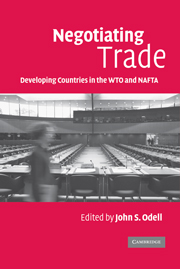Book contents
- Frontmatter
- Contents
- List of figures
- List of tables
- List of contributors
- Acknowledgments
- 1 Introduction
- Part I Multilateral negotiations
- 2 The evolution of national interests: new issues and North–South negotiations during the Uruguay Round
- 3 Reframing the issue: the WTO coalition on intellectual property and public health, 2001
- 4 The strict distributive strategy for a bargaining coalition: the Like Minded Group in the World Trade Organization, 1998–2001
- 5 Learning in multilateral trade negotiations: some results from simulation for developing countries
- Part II Regional negotiations
- Part III WTO Dispute Settlement Negotiations
- Index
2 - The evolution of national interests: new issues and North–South negotiations during the Uruguay Round
Published online by Cambridge University Press: 22 September 2009
- Frontmatter
- Contents
- List of figures
- List of tables
- List of contributors
- Acknowledgments
- 1 Introduction
- Part I Multilateral negotiations
- 2 The evolution of national interests: new issues and North–South negotiations during the Uruguay Round
- 3 Reframing the issue: the WTO coalition on intellectual property and public health, 2001
- 4 The strict distributive strategy for a bargaining coalition: the Like Minded Group in the World Trade Organization, 1998–2001
- 5 Learning in multilateral trade negotiations: some results from simulation for developing countries
- Part II Regional negotiations
- Part III WTO Dispute Settlement Negotiations
- Index
Summary
Are developing countries marginalized in the formation of global rules governing new issues such as services and intellectual property rights? This chapter shows that developing countries gave up fewer concessions in the 1994 services agreement than in the intellectual property agreement, both resulting from the Uruguay Round. The gains developing countries make in ‘high-tech’ issue-areas have been examined before. Other studies show developing country gains for a host of issue-areas, high-tech and otherwise. These studies stand in contrast to evidence documenting the inability of developing countries to understand or negotiate these new issues, or trading off their acquiescence in these issues in return for concessions in old issues.
A question then arises: Why do developing countries make fewer concessions or gain more in some new issue-areas than in others? This chapter provides a structured focused comparison to explain the difference in outcomes for two Uruguay Round (1986–94) agreements: the General Agreement on Trade in Services (GATS) and the Trade-Related Aspects of Intellectual Property Services (TRIPS). Developing countries made fewer concessions to the North in the former case than the latter.
The outcomes present contrasts with respect to each other as well as to the way the Round started. GATS allowed developing countries to walk with an agreement, allowing specific and tailored commitments across multiple issue-areas, that did not ask them to make concessions too far beyond their domestic liberalization schedules.
- Type
- Chapter
- Information
- Negotiating TradeDeveloping Countries in the WTO and NAFTA, pp. 41 - 84Publisher: Cambridge University PressPrint publication year: 2006
- 7
- Cited by



